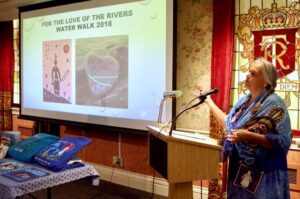Fort William First Nation Elder shares Water Walks lecture at Thunder Bay Museum

By Rick Garrick
THUNDER BAY — Fort William Elder Sheila DeCorte highlighted her most recent water walks, including the Naadowewi-Gichigami (Lake Huron) Water Walk this past summer, during her Water Walks lecture on Sept. 24 at the Thunder Bay Museum.
“It took 29 days,” DeCorte says, noting that Wiikwemkoong Unceded Territory’s Sharon Manitowabi was the lead Water Walker on the Naadowewi-Gichigami Water Walk. “I was told the last time the Water Walkers walked around Lake Huron in 2005 that it was a difficult time for the walkers — they faced a lot of racism.”
DeCorte says she thought the Naadowewi-Gichigami Water Walk would be different this time after 19 years.
“The sad news was it wasn’t that fine,” DeCorte says, noting that a property owner started cursing at her for parking at the end of his driveway. “He said to me, ‘If you want somewhere to park, use the dump down the road, you can go park there.’ And that hit me like you wouldn’t believe, for many reasons. As many of you are aware, our Indigenous women are found in these dump sites, so that really hurt. It actually brought me to tears and it took me a few hours, actually it took me the whole day to recover from that.”
DeCorte says she almost wanted to go home but was glad she didn’t because of her experience with a golden eagle afterwards.
“We were driving and the windows were down because it was a hot summer day,” DeCorte says. “All of a sudden, I looked to my right to the passenger’s side and there was this huge golden eagle that came up to my vehicle with his wings out like this. And you could hear his wings, two big hugs he gave us and then he flew away. That was so powerful and so amazing, and that made up for that negative energy that fellow brought.”
DeCorte says there were about 12 core Water Walkers who participated during the Naadowewi-Gichigami Water Walk.
“Every time we reached a community, there were other walkers that would come and join us and give us a break,” DeCorte says. “Lots of support came from the communities and the people.”
DeCorte says there are things people can do even if they may not be able to do a water walk, such as going down to a body of water and speaking to the water and “telling her you love her.”
“Sing to her,” DeCorte says. “When you’re in the shower, you can sing and then when that water leaves your home through the sewers and gets back out to Lake Superior, that love is going to reach the water spirit that lives there and make her really happy.”
DeCorte says the Water Walks are not political activism, they are a ceremony.
“Every step is a prayer from the time when we pick that water up until the time we return the water back to Lake Superior,” DeCorte says. “All our prayers and our love for the whole time we carry that water is returned to Lake Superior to bring healing to the water so that we can have water for our generation and future generations to come.”
DeCorte says caring for the water is not just an Indigenous responsibility.
“It’s yours, too, because we all come from water,” DeCorte says. “Without water, there would be no life.”
DeCorte says people who are interested in finding out more about the water walks can find information at the For the Love of the Rivers 2.0 (2022-2025) Facebook page.
“Next spring, we will be in our fourth year of our walks and that’s when you will start seeing when the dates are,” DeCorte says. “And then, you can come and join.”

